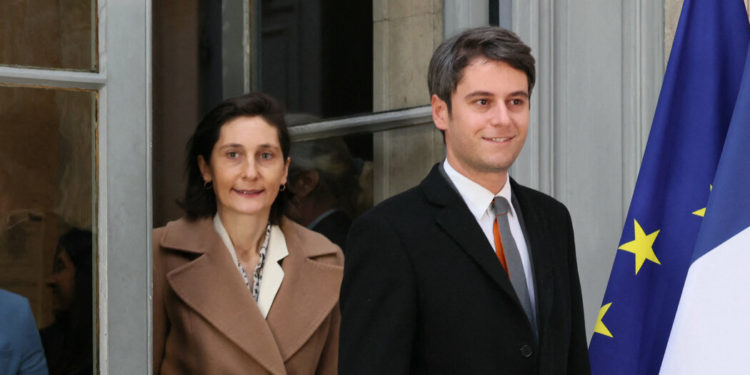By THE NEW YORK TIMES
President Emmanuel Macron of France convened a new, smaller cabinet for the first time on Friday, a day after a government reshuffle that brought in a handful of new ministers — including one poached from the right and a Europe-focused foreign minister — but that left most key positions untouched.
“A united government,” Mr. Macron said before camera crews were ushered out ahead of the cabinet meeting, which was held in a noticeably smaller room than usual. “Let’s get to work.”
Many of the 14 ministers around the table were longtime pillars of Mr. Macron’s government. Gérald Darmanin, Mr. Macron’s tough-talking interior minister; Bruno Le Maire, his perennial economy minister; and Sébastien Lecornu, the defense minister — all former members of the mainstream conservative party— have remained in place. Éric Dupond-Moretti, the justice minister, who was recently cleared in an abuse-of-power case, stayed as well.
Mr. Macron signaled a focus on Europe by appointing Stéphane Séjourné, a top ally of the French leader in the European Parliament, as foreign minister. A vote for European Parliament seats scheduled in June is expected to be a hard battle against the French far right, given that the National Rally came ahead in vote percentages in the last election in 2019.
The new cabinet was announced on Thursday evening just days after Mr. Macron appointed Gabriel Attal, 34, as the new prime minister, an attempt to reinvigorate his second term after a year of successful, but politically bruising, pension and immigration overhauls.
The new cabinet includes fewer of the little-known technocrats or members of civil society that Mr. Macron has sometimes favored in the past. Instead, it includes more veteran politicians, many of them on the right, continuing a yearslong shift in that direction by Mr. Macron.
Mr. Attal, France’s youngest and first openly gay prime minister, rejected criticism that Mr. Macron was reneging on the promise that he made when he was first elected in 2017 to transcend the country’s left-right political divide.
“What I want is action, action, action, and results, results, results,” Mr. Attal told TF1 television on Thursday night.
“I’m not here to ask my ministers to empty their pockets to show me what political party card they carry,” Mr. Attal added. “What I’m interested in is having ministers who want to address French people’s problems.”
The most unexpected announcement was the appointment of Rachida Dati as culture minister. Ms. Dati is a high-profile, outspoken conservative with little prior cultural expertise who served as justice minister from 2007 to 2009 under former President Nicolas Sarkozy and is currently the mayor of the Seventh Arrondissement of Paris. She is also under investigation in a corruption case involving Carlos Ghosn, the disgraced former chief executive of the car manufacturers Nissan and Renault.
Ms. Dati had been extremely critical of Mr. Macron in the past, calling his party a collection of “traitors from the left and traitors from the right.” She was expelled from her party, the right-wing Republicans, after her appointment on Thursday.
Ms. Dati’s predecessor, Rima Abdul Malak, was publicly rebuked by Mr. Macron last month over the fate of Gérard Depardieu, the French actor who is facing renewed scrutiny over sexual assault accusations.
Ms. Abdul Malak had said that disciplinary proceedings would determine whether Mr. Depardieu should lose his Legion of Honor, France’s highest award, over sexist comments that he made in a television documentary. But Mr. Macron has staunchly defended the actor, condemning the “manhunt” against him.
“I remained free, free in my commitments, free in the positions I took,” Ms. Abdul Malak said on Friday before handing the ministry over to Ms. Dati.
Clément Beaune, formerly a top Macron protégé leading the transportation ministry, was also left out of the new cabinet. That was widely perceived as a punishment for his reported role as ringleader of a short-lived rebellion among left-leaning ministers, who balked at the government’s compromises with the right on the tough immigration overhaul.
The new foreign minister, Mr. Séjourné, is not a career diplomat but he was the longtime leader of Renew Europe, a group of European liberals in the European Parliament. He is also the secretary general of Mr. Macron’s centrist Renaissance Party in France, and he is Mr. Attal’s former partner.
“The advent of Europe will be my priority,” Mr. Séjourné said at a joint news conference on Friday with his predecessor, Catherine Colonna.
While the new cabinet, excluding Mr. Attal, has an equal number of men and women, Ms. Colonna’s departure means that the most powerful ministries are now all held by men.
The team is also much smaller than Mr. Macron’s previous cabinet, which ballooned to about 40 members. He achieved this partly by merging some responsibilities.
Catherine Vautrin, a right-wing politician from Reims who became the new labor minister, will also be in charge of health. Amélie Oudéa-Castéra, who was formerly in charge of sports, is now also leading France’s large education ministry — in addition to overseeing preparations for the upcoming Summer Olympics.
Several junior positions will be filled in the coming days to support and supplement the fully fledged ministers, Mr. Macron’s office said. But labor unions representing teachers and health professionals quickly expressed doubts that they would have the undivided attention of their new overseers.
“Does this mean that national education is going to be stuck between beach volleyball and hammer throwing?” Sophie Vénétitay, the leader of one of the main teacher unions, said on Franceinfo radio.







Discussion about this post